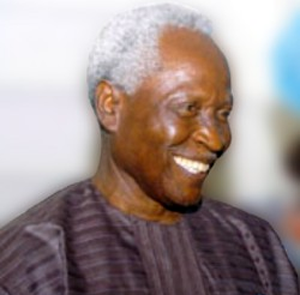In memoriam Elechi Amadi (1934-2016)
 Nigerian writer Elechi Amadi died on 29 June at the age of eighty-two. He was among the first generation of African writers and novelists, and most of his work was published in the famous, now classical, Heinemann African Writers Series, which has also become available as an online resource (restricted access).
Nigerian writer Elechi Amadi died on 29 June at the age of eighty-two. He was among the first generation of African writers and novelists, and most of his work was published in the famous, now classical, Heinemann African Writers Series, which has also become available as an online resource (restricted access).
Elechi Amadi was born on 12 May 1934 in an Igbo family in Aluu near Port Harcourt in the Ikwerre local government area in eastern Nigeria. He studied at the University of Ibadan where he obtained a degree in Physics and Mathematics.
He worked as a land surveyor and later was a teacher at several schools, including the Nigerian Military School. Amadi also served in the Nigerian army and retired at the rank of captain. He supported the Federal cause during the Nigerian civil war (Biafra war), 1966-1970, but resigned from the army during the war. After the war he held various positions with the newly formed Rivers State government.
Amadi's first novel, The Concubine (1966), was immediately highly acclaimed. Together with The Great Ponds (1969) and The Slave (1978), it became the historical trilogy he is most known for. The novels depict traditional African village life before Western imperialism, without in any way romanticising it. In particular, Amadi explored feuds and violence, and the often conflictual relationship between individuals and their community, and also the relationship between individuals and their gods. Supernatural elements are usually intertwined with everyday events in Amadi's books.
Elechi Amadi also wrote plays, poetry and non-fiction work. His first work of non-fiction, Sunset in Biafra: A Civil War Diary, published in 1973, documents his experiences as both a soldier and a civilian during the civil war. It is clear where Amadi's sympathies lie, and the title of the book, Sunset in Biafra, mocks the Biafran flag, which depicts a sun-rise. Yet Amadi tried to give both sides their due: he shows the way in which the Igbos were harshly provoked, and makes it clear that Federal soldiers were also guilty of atrocities.
The Biography of Elechi Amadi in the African Writers Series Database has been heavily used for this text.
For all the publications of and on Elechi Amadi in the ASCL Library see here.
As a tribute to Elechi Amadi a small exhibition of his books has been set up in the library.
Elvire Eijkman

